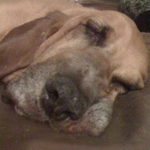And another article from Medscape Medical News which might be of interest -
Mars
Cognitive Deficits of Sleep Deprivation Kick in Early and Linger
by Kate Johnson
December 7, 2010 (Miami Beach, Florida) — It may take more than sleeping-in on the weekend to reverse the effects of a week of poor sleep, but many people who are sleep deprived fail to recognize those effects, according to research presented at the American College of Neuropsychopharmacology 49th Annual Meeting.
The effects of sleep restriction are immediately experienced by the brain after just 1 short night of 4 hours' sleep, said David Dinges, PhD, professor and chief of the Division of Sleep and Chronobiology in the Department of Psychiatry at the University of Pennsylvania (UPenn) School of Medicine in Philadelphia.
Burning the candle at both ends for just 1 workweek can result in a steady accumulation of cognitive problems that many people are not fully aware of, he told a press conference before the meeting.
"There is a slow build-up over time, which is most dramatic in attention and working memory and cognitive speed. In other words — how fast you think, your ability to attend to things and respond quickly from a motor standpoint, as well as your ability to use your working memory," Dr. Dinges said.
In his studies, when subjects are deprived of sleep for 5 consecutive nights, "people report that they are sleepier, but that report does not get worse across the week even though cognitive function is getting worse. So there's some dissociation in the brain between our ability to introspect, how we're doing, and how the brain is actually functioning," he explained.
Not surprisingly, there is a wide variation between individuals in response to both sleep deprivation and recovery sleep — some of which can be explained by genetics, he said.
"There's a subgroup of people who seem to have very dramatic responses to this. That is to say, they get cognitive deficits and impairments very early in the restriction and never seem to completely recover in a single night. There are also those who are somewhat resistant," Dr. Dinges reported.
In 2 recently published studies, Dr. Dinges and his colleagues examined the cognitive decline associated with sleep restriction and the amount of recovery sleep needed to normalize brain function.
For 1 study, the first to date to systematically examine sleep dose, recovery, and neurobehavioral deficits, 159 healthy adults (median age, 29 years) were randomized to a control group of 10 hours of sleep or time in bed (TIB) for 5 nights in the sleep laboratory or 5 nights of sleep restriction (4 hours TIB, also in the laboratory) (Sleep. 2010;33[8]:1013-1026).
All subjects were first subjected to a washout period of 2 nights of full sleep (10 hours TIB) to eliminate any baseline sleep deficits.
Subjects who were deprived of sleep were then randomized to 1 of 6 recovery sleep doses: 0, 2, 4, 6, 8, or 10 hours TIB for 1 night.
As expected, there was a negative impact of sleep restriction on neurobehavioral outcomes compared with controls.
These outcomes were measured using the Psychomotor Vigilance Test (PVT), the Karolinska Sleepiness Scale, and a modified Maintenance of Wakefulness Test.
Secondary outcomes included psychomotor and cognitive speed as measured by PVT reaction times and the Digit Symbol Substitution Task, respectively, and subjective fatigue measured with the Profile of Mood States.
The main finding of the study was that although these neurobehavioral deficits improved monotonically with sleep recovery — as sleep duration, sleep stages, and sleep intensity returned to normal — the recovery was not complete even after a recovery sleep of 10 hours TIB.
"Behavioral alertness and subjective sleepiness did not fully recover," wrote the study authors. "It appears, therefore, that a simulated workweek with 5 nights of chronic partial sleep loss can continue to adversely affect waking neurobehavioral functions even after a night of extended-duration recovery sleep."
Dr. Dinges and his colleagues noticed "robust interindividual differences in response to the same sleep loss conditions." In another study they found that the presence or absence of human leukocyte antigen DQB1*0602 allele may partially explain this (Neurology. 2010;75[17]:1509-1519).
DQB1*0602 is closely associated with narcolepsy, although it can be found in healthy, nonnarcoleptic subjects, and "may be involved in common features shared between positive normal sleepers and narcoleptic subjects," wrote the study authors.
Their study included 92 DQB1*0602-negative and 37 DQB1*0602-positive healthy subjects who were subjected to 2 nights of baseline sleep (10 hours TIB) in the laboratory followed by 5 nights of sleep restriction (4 hours TIB).
Neurobehavioral tests showed steady declines in both groups as sleep deprivation progressed — yet no differences between the groups.
However, both at baseline and during sleep deprivation, DQB1*0602 positivity was associated with disruptions in sleep homeostasis and physiologic sleep, as well as increased sleepiness and fatigue, they reported.
"DQB1*0602, therefore, may be a genetic marker for determining responses in the general population to basal conditions and chronic partial sleep deprivation, Dr. Dinges reported, a condition associated with significant health consequences and experienced worldwide by millions of individuals frequently due to work and social obligations," they wrote.
Dr. Dinges' findings about the effects of sleep deprivation pertain only to healthy adults who choose to reduce their sleep time and cannot be generalized to people of other ages or people with insomnia.
"The work that Dr. Dinges and his group at UPenn are conducting is on the absolute cutting edge of this critical area of scientific research," said Thomas J. Balkin, PhD, chief of the Department of Behavioral Biology at Walter Reed Army Institute of Research in Silver Spring, Maryland, when reached for comment.
Dr. Balkin, who currently chairs the board of the National Sleep Foundation, has also published extensively in the area of sleep deprivation.
"Individuals demonstrate huge differences in susceptibility to the effects of sleep loss," he told Medscape Medical News.
"Improved understanding of the biological basis of these differences will likely foster technologies for improved prediction and monitoring of sleepiness in operational environments (eg, the airline industry) and nonoperational environments (eg, on the nation's highways). This will generally improve safety, productivity, and quality of life, constituting a major boon to society," Dr. Balkin told Medscape Medical News.
Dr. Dinges disclosed that he is the editor-in-chief of Sleep and is compensated for this by the Associated Professional Sleep Societies, LLC. He also receives honoraria and travel support for serving on the Scientific Advisory Council of Mars Inc. Dr. Dinges has been compensated for scientific consulting for Sanofi-Aventis, Merck, Eli Lilly, Somaxon, and Actelion. Dr. Dinges receives research contract funding for technical services from Merck & Co and receives support for grants from the National Institutes of Health, National Aeronautics and Space Administration, and National Space Biomedical Research. Dr. Balkin is the chair of the National Sleep Foundation.
American College of Neuropsychopharmacology (ACNP) 49th Annual Meeting. Presented December 6, 2010.













